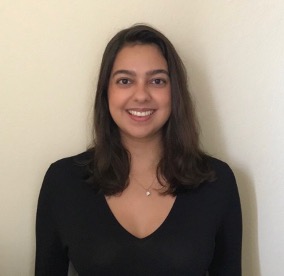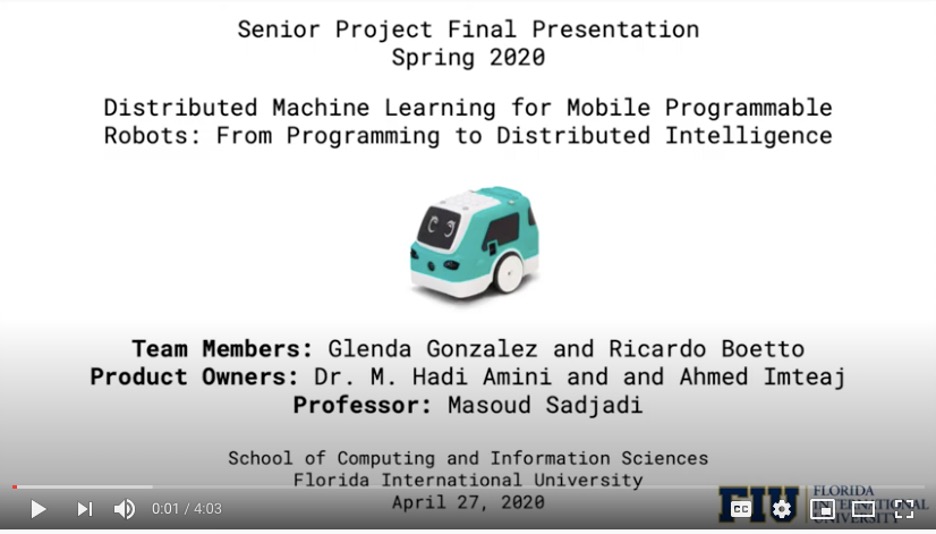In this time of uncertainty, when so many things have been put on hold due to the COVID-19 pandemic, two students rose above these challenges to complete their senior design project, remotely.
Although the College of Engineering & Computing Senior Design Showcase was canceled this year, these students pushed forward and completed their project successfully. The two students are Glenda Gonzalez, an aspiring software engineer who will be interning at Wells Fargo this summer, and Ricardo Boetto, a computer science student who will be starting as a software engineer at American Express in August. Both students will be graduating from the College of Engineering & Computing in 2020.
Gonzalez and Boetto continued working with FIU’s Sustainability, Optimization, and Learning for InterDependent Networks (SOLID) laboratory’s programmable robots and successfully completed their project. The project is entitled, “Distributed Machine Learning for Mobile Programmable Robots: From Programming to Distributed Intelligence.”
As a part of their senior design project, these students explored the potential deployment of machine learning and artificial intelligence algorithms on movable robots. To this end, they used an intelligent, programmable robot named Zumi. They implemented and expanded on built-in features of the robot, such as obstacle avoidance, color classification, QR codes and facial detection. Additionally, they explored the robot’s capabilities pertinent to computer science research and education, to determine whether it is a suitable platform for modeling distributed machine-learning algorithms.
Part of the goal of the SOLID lab at FIU is to develop algorithms aimed at solving decision-making problems. This senior design project and future steps of the project help the researchers answer questions about whether robots of this type serve as good models for this kind of work.
While Gonzalez focused on obstacle avoidance and color classification, Boetto focused on executing drive commands via QR codes and on facial detection. They presented the work through a series of YouTube videos.
Gonzalez’s obstacle-avoidance work used infrared sensors, which bounced off nearby objects and alerted Zumi to potential obstacles. For color classification, Gonzalez reported that each color has a hue, saturation and value. By recognizing and interpreting these data sets, Zumi was able to report what color was directly in front of it. Going off this work, they were able to give Zumi commands based on colors, with green causing Zumi to move forward and red causing Zumi to stop, independent from any other programming or commands.
Boetto’s work led to Zumi’s ability to interpret multiple commands from QR codes. In the video example, Zumi was able to interpret the command to move forward simply by analyzing a QR code held in front of it. Finally, Zumi can detect faces, although it cannot identify them. In the future, Gonzalez predicts that this is something it will be trained to do.
“We had a physical project and COVID-19 forced us to scratch it, seizing any further advancement in the direction we intended to go,” said Boetto in one of their four presentation videos.
The original intention was to create a fleet of robots that would work together synchronously, but closed labs and the inability for the two partners to really interact forced them to change their approach.
“There was a lot of spit balling, a lot of trying to get something running,” said Boetto.
Another shortcoming was that Zumi is actually a training robot, not necessarily designed or equipped for the higher-level programming skills of Gonzalez and Boetto.
However, through hard work and dedication, these two students were able to change their design, overcome the challenges and complete their senior design project from home.
These students were aided by esteemed members of the CEC and SOLID lab communities. Their advisor was M. Hadi Amini, an Assistant Professor at the School of Computing and Information Sciences. Their senior design course instructor and supervisor was Masoud Sadjadi, an Associate Professor at the SCIS. The graduate student mentor for this project was Ahmed Imteaj.
Gonzalez will be graduating with bachelor’s degrees in computer science and psychology. Her interests include human-computer interaction, artificial intelligence and machine learning. Boetto’s main focus during his tenure at FIU was computer graphics and multiprocessing. He also has a degree in English literature with an emphasis on critical literary theory.



